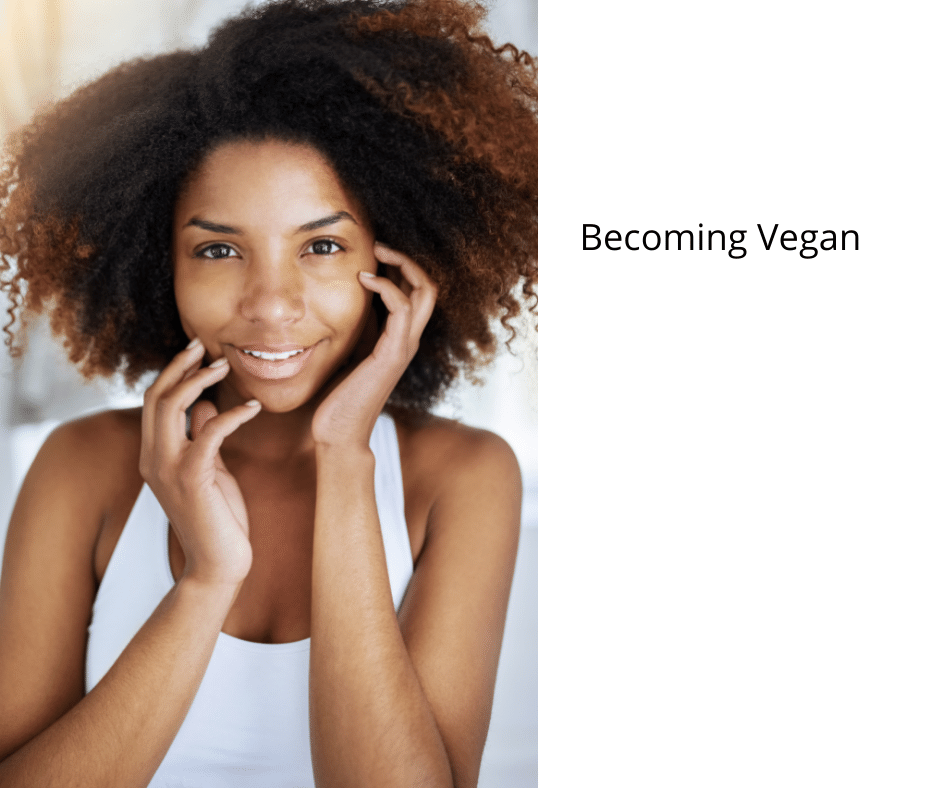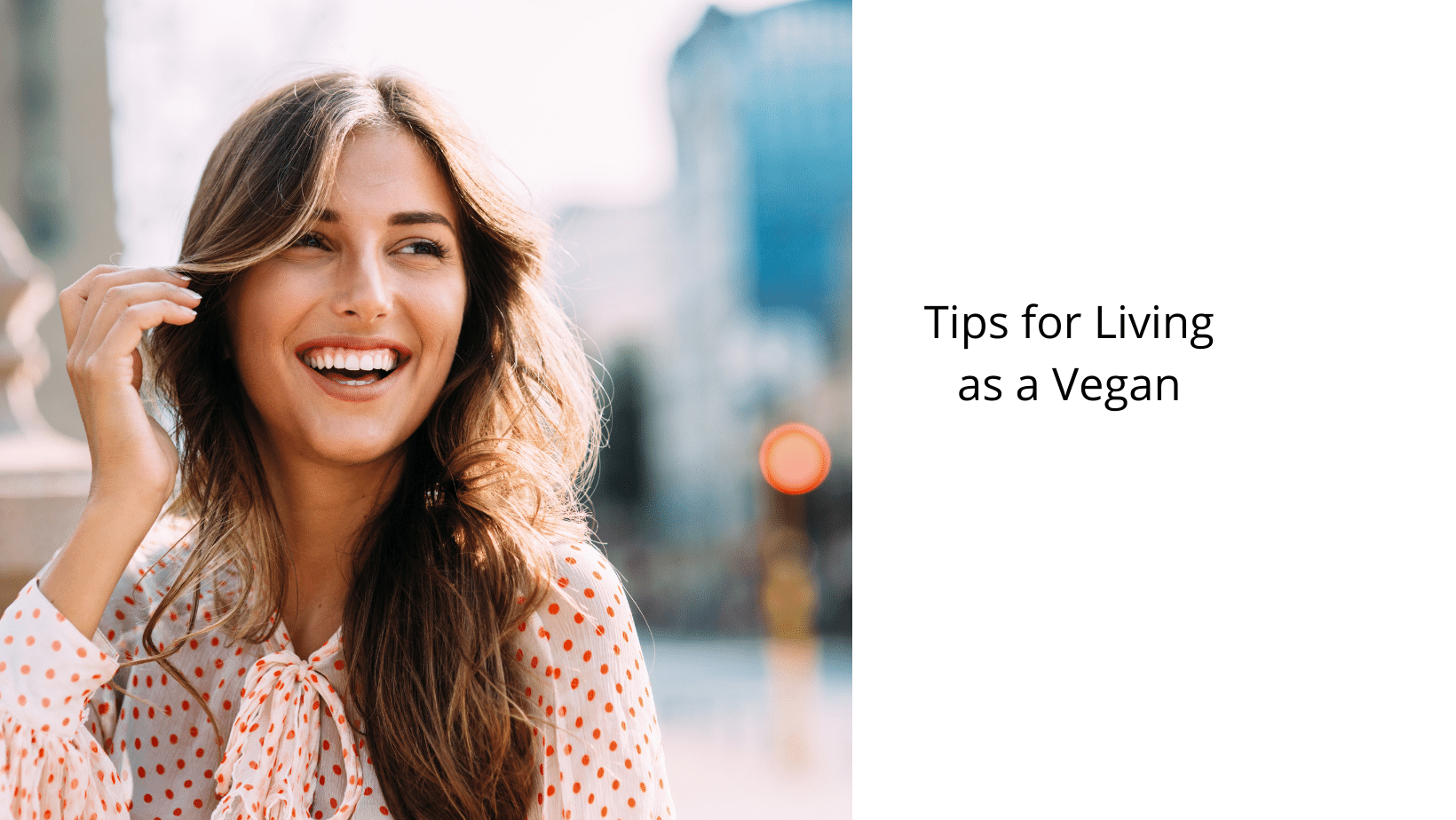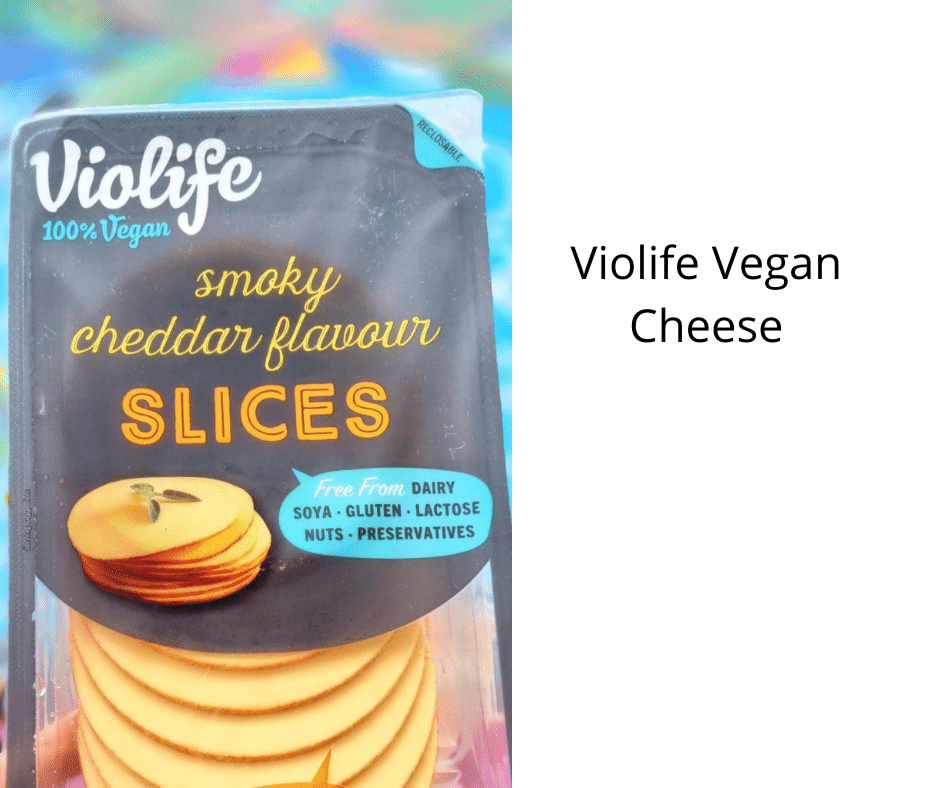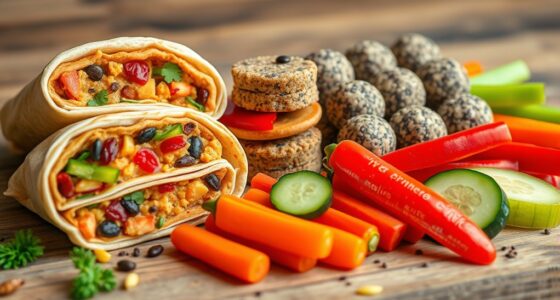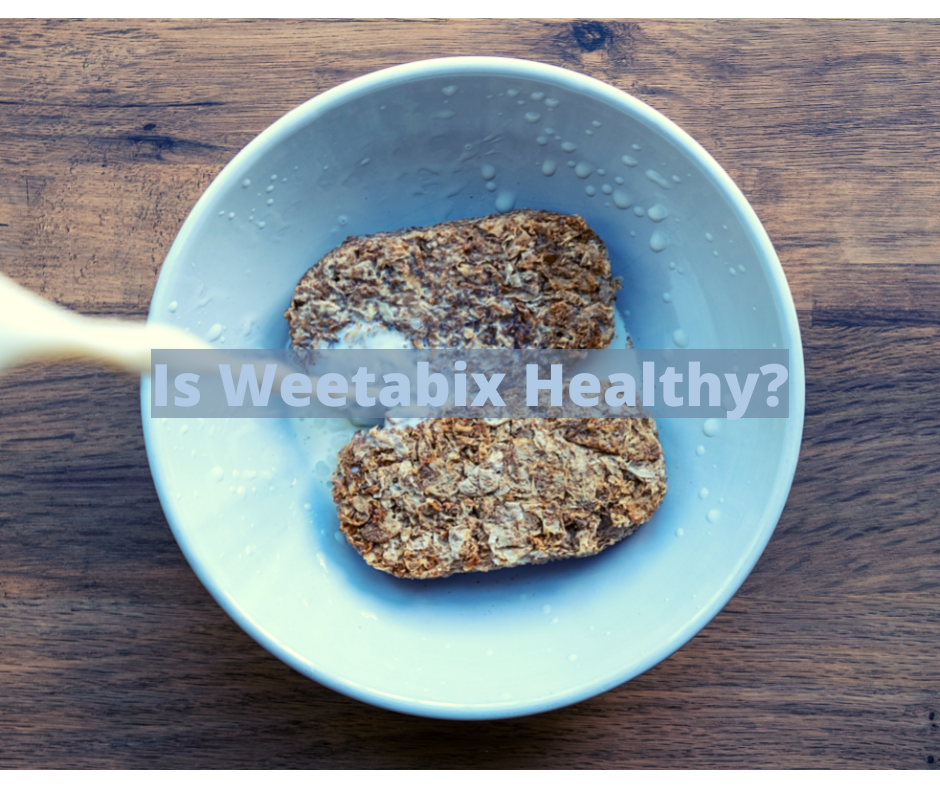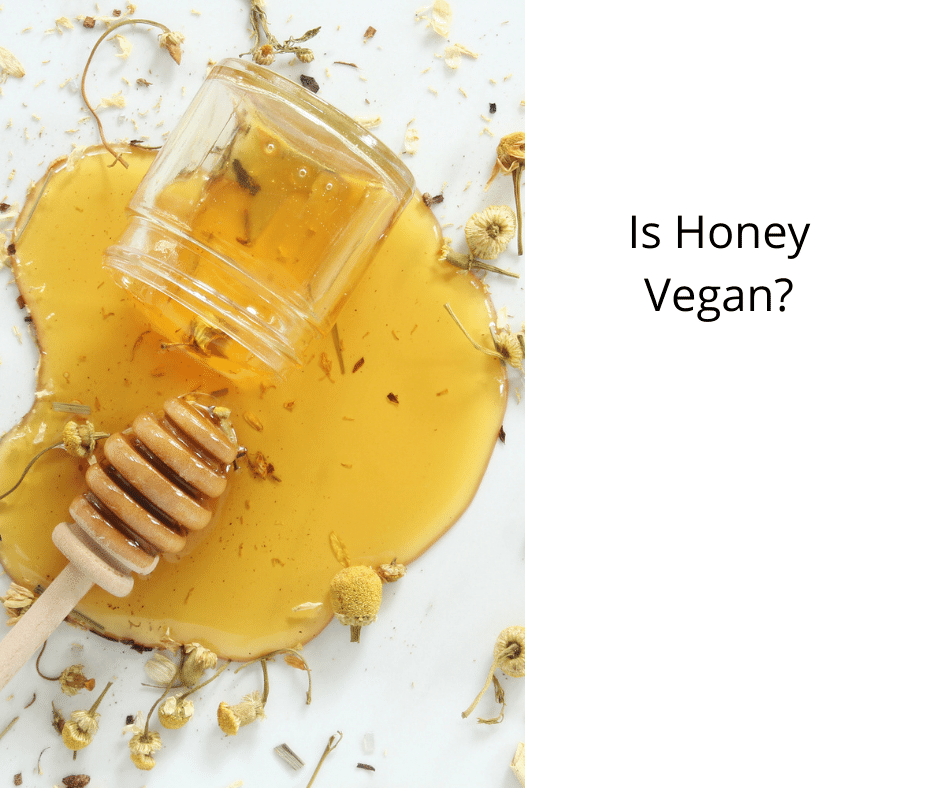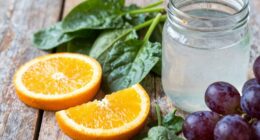Are you interested in transitioning to a vegan lifestyle? You’re not alone in your curiosity about veganism. Google reported that the popularity of veganism reached an all-time high last year. With the increasing hype surrounding plant-based products, it’s no surprise that veganism is gaining momentum. This movement is not just a passing fad; it represents a meaningful step towards showing more compassion for animals and enhancing personal well-being.
What Does Vegan Mean?
Vegans will avoid products that are directly derived from animals. Vegans avoid eating meat, milk, and eggs. Vegans do not use animal-derived cosmetics or ingredients that have been tested on animals. They also avoid furniture and clothing from animal-derived materials such as leather, suede and wool. Many cultures and generations can practice veganism for many reasons.

Why Do People Become Vegan?
There are many reasons why people become vegan. Some people become vegan for the animals because they believe that animals should not be exploited or killed for human consumption. Others become vegan for their health because they believe a plant-based diet is healthier than a meat-based one. Still, others become vegan for environmental reasons because they believe that producing meat and dairy is environmentally unsustainable. Whatever the reason, there are many benefits to becoming vegan.
For the Animals
Each person has a unique relationship with animals. It is not surprising that 75% of Americans love animals.
We care about animals and do not want them to suffer. Millions of loving, sentient animals are subjected to daily abuse to get on our plates. Behind closed doors, meat businesses subjected chickens and pigs to the worst abuse. They keep pigs in cages that restrict their movement. They take the helpless baby cows right away from their mothers, just moments after birth. They boil live chickens.
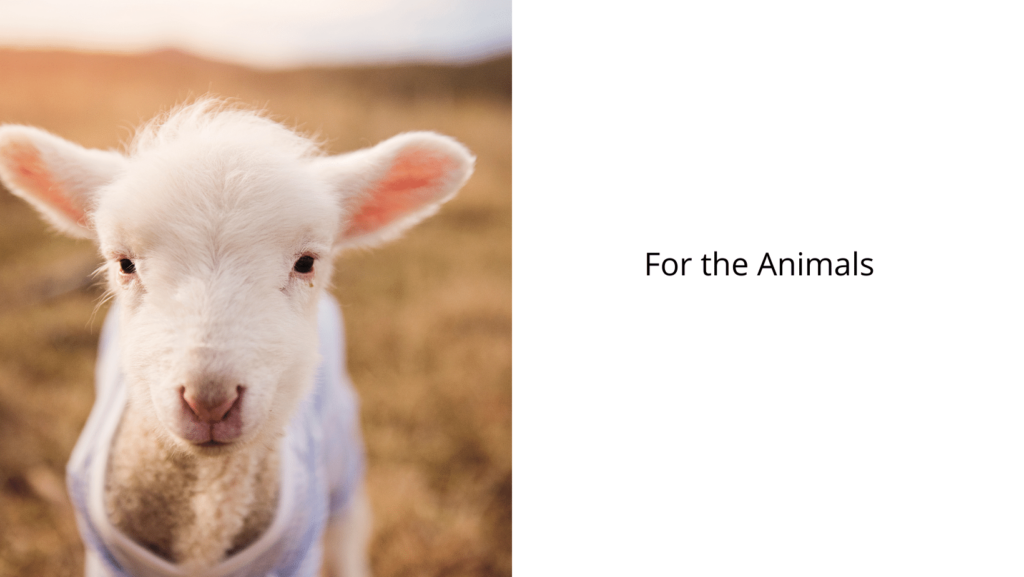
These cruelties are exactly why factory farms and slaughterhouses don’t allow visitors to tour their facilities. It would be great if more people could see the cruelty at work in factory farms. It is possible to end factory farms from causing terror by giving up animals and switching to compassionate, plant-based alternatives.
To end cruel factory farming, you can stop eating animals. Lower demand means fewer animals will be born to endure cruelty in factory farms and end up on your plates. In fact, Barbara J. According to King, veganism can save 95 animals each year from factory farms.
Veganism helps animals decrease their demand for animal products. Veganism is an ethical choice. This allows you to show respect for animals as living beings. Natalie Portman, an actress, articulated this sentiment to an interviewer when asked why she went vegan.
“I realized I was taking advantage of animals’ lives to feel better for a second, which is absurd because I wouldn’t do that to any other human being. It just clicked for me one day and has made such an impact on my life.”
For Your Health
Our bodies need food to fuel them. It provides energy for our bodies, helps us stay active, sharpen our minds, and protects us from diseases. If we eliminate animal products and eat plant-based foods, our bodies will reap the benefits of higher-quality nutrients.
Whole plant-based foods such as vegetables, fruits, and legumes are high in vitamins and minerals that our bodies need to thrive. These foods also have low cholesterol. Doctors recommend avoiding meats such as burgers and sausages to reduce the risk of suffering from heart attacks or strokes. Studies have shown that plants may help to reduce inflammation, which is the main cause of chronic pain.
Consuming Animal Products Is Linked to Cancer
Processed meats have been classified as a Group 1 carcinogen by the International Agency for Research on Cancer of the World Health Organization. There is strong evidence that processed meats can cause cancer. Hot dogs, sausages, and corned beef are all processed meats. These meats are preserved in various ways, including curing, salting or smoking.
Consuming 50g of processed meat per day, equivalent to two slices of deli turkey and less than one hotdog, increases the risk of developing colorectal cancer 18%. Consuming animal products isn’t the only health concern. Consuming animal products can lead to increased levels of unhealthy cholesterol, heart disease, strokes, foodborne illness, and other health problems.
These health issues can be avoided by eating a plant-based diet. Fiber is an essential component of a healthy digestive system. Whole plant foods are rich in fiber. Fiber helps lower cholesterol and prevents strokes and heart disease by keeping our arteries clean. Lower risk of developing type II diabetes is associated with vegan diets.
It’s not about avoiding certain diseases. Plant-based foods can improve moods and energy levels. According to a study published in Nutritional Neuroscience, vegans felt more energetic and less depressed after switching to a vegan diet.
Our bodies still need protein from plant-based foods. German researchers discovered that athletes who followed a plant-based diet and added B-12 to their diet had slightly higher nutritional requirements than those who ate meat. Many professional athletes have switched to a plant-based diet. Scott Jurek (the Venus Williams’ tennis player) and Alex Morgan (the US women’s soccer star), are two examples. In the most recent NFL season, 15 Tennessee Titans players tried veganism. Their improved performance was attributed to plant-based diets.
Veganism is popular among athletes looking to improve their performance. Veganism does not mean you must be a professional runner or an athlete. Learn how veganism can help you improve your health.
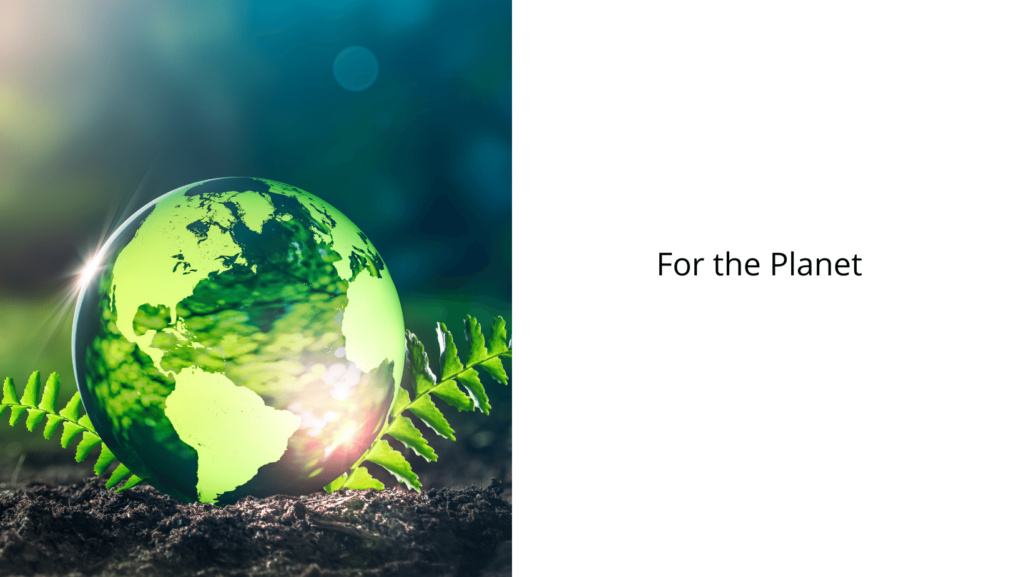
For the Planet
It is possible to make small daily changes to help the environment and be kind to the planet. For example, turning off the lights when we aren’t there, using reusable bags at The Grocery Store, and taking public transit to work instead of driving. What we eat is the most critical factor in our planet’s health. By choosing compassionate, plant-based foods, it benefits not only the animals, but also our planet. A University of Oxford study found that veganism is the best way to reduce your environmental footprint.
Plant-based foods are less harmful than animal agriculture, which is why they’re so popular. 14.5% of global greenhouse gas emissions are from animal agriculture, which is responsible for warming the environment and speeding up climate change. This figure is higher than the entire global transportation industry.
Although taking shorter showers and turning off the water tap when you brush your teeth can save water at home it is not a good idea to use more water for animal agriculture. One pound of beef takes approximately 1,800 gallons. This is equivalent to 12 hours of continuous showers. Around 20% of freshwater worldwide is used in meat and dairy production.
The immense global impact of the meat industry on the planet is not surprising that the United Nations’ most recent climate change report highlighted plant-based diets as an opportunity to mitigate the impacts of climate change. Vegans are beginning to take action to address the crisis. It is one of the most important decisions you make every day for the planet.
A plant-based diet is one of the best ways to feed the growing world population. According to the United Nations, we will need to produce 60% less food by 2050 in order to feed the entire world. Animal agriculture is responsible for 80% of the world’s agricultural land, but only 18% of our calories. If everyone ate more plant-based foods, we could save a lot of land.
Plant-based diets are not only more efficient but also more equitable. Animal agriculture is a major problem for indigenous peoples and marginalized communities all over the globe. For example, large dairy and meat companies in Latin America have bought up vast tracts, often forcibly dislocating indigenous communities. This is called the “land grab”.
Animal agriculture has a significant impact on the world, and it also causes immense suffering. Animals raised to eat are often kept in cramped, filthy conditions and treated with growth hormones and antibiotics. They also have to endure painful procedures. The animals are then slaughtered in cruel ways in slaughterhouses.
Veganism is one of the most compassionate things you can do to help animals. You can end the suffering of animals raised for food by choosing plant-based foods. It is possible to save wildlife from being destroyed in the meat industry. For example, the Amazon rainforest is being destroyed at an alarming pace to make way for cattle ranching. This is not only destroying important habitats for animals, but it also contributes to the global climate crisis.
Veganism is an ethical and compassionate choice that benefits animals, the planet, and our own health. We can all make a difference in creating a better world by making this choice.
Veganism has Many Benefits
Here are some of the many health benefits of veganism.
- Veganism is the best option to improve animal welfare. Animals raised to eat are often kept in cramped, filthy conditions and treated with growth hormones and antibiotics. They also have to endure painful procedures. The animals are then slaughtered in cruel ways in slaughterhouses.
- World hunger: Animal agriculture is a huge waste of water and land that could be used for food production. We can end hunger by choosing plant-based food.
- Environment: The main cause of water pollution, deforestation and water consumption is animal agriculture. It also contributes to climate change. We can reduce the terrible impact of animal agriculture by choosing plant-based food.
- Human health: Veganism is associated with lower rates of obesity, heart disease, and type 2 diabetes. You are also less likely to get certain types of cancer.
Plant-based diets can help you keep your weight healthy and lower your cancer risk. Excess weight can cause inflammation and hormonal imbalance, which are linked to an increased risk of developing cancer. A plant-based diet excludes foods that may increase or cause weight loss.
The plant-based diet has also been shown to lower cholesterol, body mass index and HbA1C. It also lowers the need for medications to treat chronic diseases. It may lower your risk of developing ischemic heart disease. A plant-based diet is rich in antioxidants. It has been shown to be effective in treating various conditions, including diabetes, heart disease, cancer, and other diseases. It is also rich in fiber. You can feel healthier and lose weight by eating lots of fruits, vegetables, nuts, and seeds.
A plant-based diet has fewer calories and less saturated fat. Vitamins are also found in dairy products like soy milk. Plant-based dairy products can be purchased or made by you. Many plant foods are high in protein. Soy products can give your dishes a meat-like texture, while beans and legumes are a good source of protein.
A plant-based diet can help with chronic disease prevention and treatment. It is also good for overweight people. Plant-based diets are associated with weight loss, reduced mortality and increased risk of cardiovascular disease. It may offer a solution to many chronic diseases that plague so many people.
Research shows that eating vegan foods may reduce your chance of dying from certain cancers by up to 15%. Plant-based foods are rich in vitamins, fiber, phytochemicals, and other nutrients that may help protect your body from certain types of cancer. Research into the impact of diet on cancer risk is mixed. According to the International Agency for Research on Cancer, red meat is “probably carcinogenic,” which increases the risk for colorectal cancer. A vegan diet could lower your risk of developing heart disease by 24% compared to an omnivorous one.
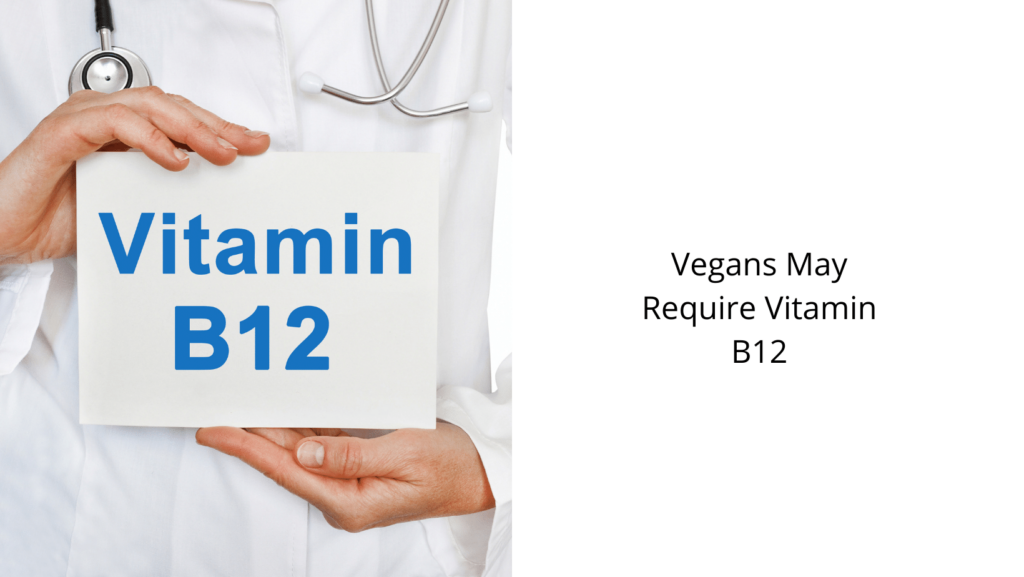
Vegans may require vitamin B12. Vitamin B12 levels that are low can cause anemia. As we age, our ability to absorb vitamin B12 is affected. It is essential to consult your physician before you start a vegan diet, or if you are considering taking a supplement.
There is a lower chance of developing heart disease
Cholesterol is a key component in animal products like chicken, eggs and shrimp. This can lead to blood vessels clotting and increase the risk for developing heart disease, America’s number one killer. Our lifestyles can be changed to reduce the risk of developing heart disease. If you are concerned about your heart health, it is a good idea for you to eat plant-based foods.
Better Gut Health
If you suffer from gastrointestinal issues, there may be a relief. Fiber is essential for maintaining a healthy stomach. Vegetarian food is high in fiber. However, animal products contain very little fiber or none at all. Vegan foods don’t contain lactose, which is a sugar compound found in milk and other dairy products. Over 65% of the world’s population suffers from lactose intolerance. This means that they are unable to digest cow’s milk properly. Many people are shocked to learn that dairy products have been eliminated. They no longer experience abdominal discomforts, bloating, gas, nausea, or diarrhea caused by dairy products.
There Is a Lower Chance of Developing Cancer
The leading cause of death in America is cancer. Although we still have a long way to go before a cure for cancer, there are some ways we can reduce our risk. Researchers compared almost 70,000 volunteers’ eating habits to discover that vegans had the lowest cancer rates.
Vegans avoid eating processed meats such as hot dogs, bacon, and cold cuts. Although processed meat has been classified as a “known carcinogen” by The World Health Organization, it remains in the same category as cigarettes and ultraviolet radiation.
Diabetes Risk is Lower
Millions of Americans already suffer from Type 2 Diabetes. There are millions more at-risk. Type 2 Diabetes is directly related to what we eat. You can reduce your risk by switching from animal-based diets to plant-based. Vegan diets can control blood sugar and prevent insulin depletion, leading to chronic diabetes. According to the Harvard School of Health, as little as 20% of people who avoid animal products will develop diabetes. Switching to whole foods, and plant-based diets can help reverse Type 2 diabetes.
Improved Mood and Brain Health
It is interesting to see that bacteria in our stomachs not only impacts our gut health but also produces hormones that impact brain function. Trisha K. is a plant-based nutritionist.
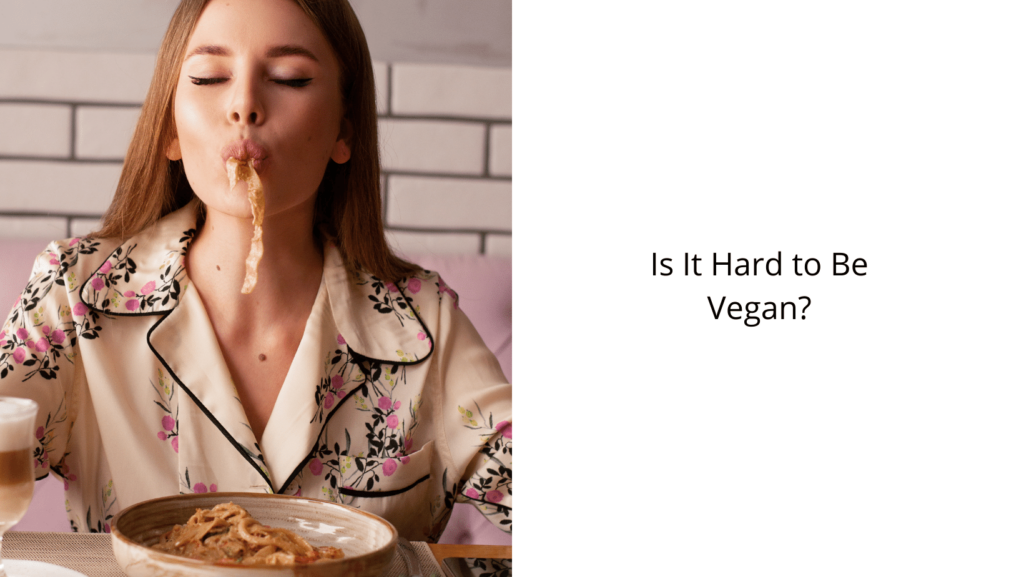
Is It Hard to Be Vegan?
As we’ve seen, there are many advantages to living a vegan life. It can seem daunting to make major changes to your lifestyle or food choices. Thanks to the increasing popularity of plant-based products, it is easier than ever to become vegan. You have many options for helpful tips and tricks to help you on your way. These are six steps to help you get started.
How to Switch to a Vegan Diet
It can be hard to transition to a vegan lifestyle. But if you plan well, it is possible. It is important to get to know veganism and learn as much about it as possible. Learn about the many benefits of veganism, discover your reasons, and how to eat a plant-based diet best. Learn about the origins of ingredients.
You can start by including more plant-based foods in your meals. You can include legumes and tofu into your diet. Start by eating more seeds and nuts. You can eventually stop eating animal products. You can slowly eliminate other animal products by gradually phasing out, starting with eggs and dairy.
Next, you should try new vegan recipes. You should try new dishes at least once per week. You might be amazed at how many vegan foods are available. Your body will adjust to the new lifestyle and you will stop craving animal-based food. It is a good idea to join a vegan club and volunteer at an animal-rights group.
Avoid processed foods when you are switching to a vegan diet. Try to eat fresh, whole foods. Learn as much as you can about nutrition and the different ways to prepare them. This can be done by hiring a plant-based dietetican.
You can also make a transition to veganism by meeting new vegan friends in your community. You can share recipes and plan a meal together. You can also learn about new vegan options and watch documentaries together. You can share your stories and become great friends by getting together.
You can start the transition to veganism if you are already a vegetarian, or a meat-eater. You’ll soon be more comfortable eating plant-based food and will be able add more plant-based meals to your daily diet. This will make it easier to transition to veganism.
It takes hard work and commitment to change your eating habits. There will be mistakes, but you can learn from them. Fresh fruits and vegetables are good for you, the planet, and animals. You can celebrate your achievements and use them to motivate you to keep going.
After you’ve decided to go vegan for the first time, make sure you stock up on healthy grains and produce for all your meals. Unsweetened almond milk can be used in place of dairy milk. Healthy fats can also be found in nuts like flax, hemp and chia seeds. Legumes can be a staple in your diet and help you to complete your meals.
Also, you should try out plant-based dairy substitutes. Learn more about nutritional yeast, and other plant-based products. You can make vegan sour cream, coffee creamer, and tofu ricotta. If you have never been vegan, getting used to the idea of not having dairy may take some time.
How to go vegan
1. Learn more
You probably started your research on vegan lifestyles by reading this article. This is the first step to making the switch! Many websites, books, and documentaries can help you understand veganism and why it is important to change. We are now at step 2.
2. Find your Why
We’ve already talked about reasons why vegans might choose to be vegetarian, such as animal welfare and the environment. What makes you vegan? If you understand what motivated you to start your journey on a plant-based path, it will be easier for you to stay on the right track.
3. Add more before subtracting
If you find changing your eating habits daunting, start small. You can gradually introduce more plant-based foods to your diet while gradually eliminating dairy and eggs. Try a new plant-based recipe once per week or go to a local vegan restaurant to introduce new foods into your diet.
4. Ask for help
Veganism does not happen automatically. Even those who have been vegan for decades needed to make the change. Ask for help with ingredient substitutions, recipe changes, and grocery lists. Many online communities allow vegans to meet up and share their experiences with each other, even if you don’t live nearby. Reddit and VeganFB groups are great for finding vegans around your region or the world.
5. Do something kind for yourself
It can be hard to make a lifestyle change. Every meal you eat can make a difference. Even if you do make mistakes, just one meal with plant-based ingredients can help reduce carbon emissions. This can have a huge impact!
6. Don’t give up
According to behavioral science, forming and sticking with a habit takes 2-8 months. Although it is possible to encounter challenges along the journey, it will become much easier if you persist.
What are some foods I should eat to become vegan?
Veganism can be done in many ways. You can adapt a vegan lifestyle for different cultures and cuisines. Even familiar foods can be incorporated into plant-based products, which will replicate the texture and flavor of meat and dairy. Veganism doesn’t mean you have to miss out on the many benefits. You might actually be more open to trying different foods.
You can make the transition to a vegan lifestyle by doing these things.
Vegan Omnivore
If you’re currently eating an omnivorous diet, which includes meat, dairy and eggs, it might be worth gradually but consciously eliminating animal products to become vegan. Either start by eliminating and replacing one ingredient, or choose one day per week that you want to become vegan such as Meatless Monday.
Two lists may help make the transition from an omnivore vegan into an omnivore. The first list will include animal-based foods that you will gradually eliminate, while the second list will contain plant-based foods that you can add to your meal plan. As you learn more plant-based foods, it may be easier to eat vegan all the time.
Vegetarian closely followed by veganism
Some people find it helpful to switch to veganism and eat a vegetarian diet. This excludes meat, poultry, pork, fish, and any other animal products. Vegetarianism differs from veganism in the fact that vegetarians can still consume milk and eggs.
As you progress, you can start to include more plant-based alternatives to dairy and eggs. This is similar to the omnivore/vegan transition. You could substitute your morning eggs with a protein-rich tofu scramble or add oat milk to your favorite coffee. There are many dairy-free options. You will not be able reap the ethical, health, and environmental benefits of veganism if you stop eating dairy products and eggs.
Veganize to the maximum
Veganism is not for everyone. Some people might feel inspired to quit eating animal products and go vegan after reading about the many benefits of veganism. Although it can seem difficult, it is possible. You are making a positive choice for animals, the environment and your own health.
You can find many programs that will help you achieve this goal, including Veganuary and Challenge 22. Each program will require you to become a vegan for at most one week. It will also provide support and encouragement. This is a great way to get involved with the vegan lifestyle, and keep you motivated.
These are just a few more ways to become vegan.
Veganism can help you make positive changes in your life. Get our free starter guide to plant-based food for more inspiration. This guide contains helpful tips, recipes, as well as other information that will help you get started on your vegan journey.
You can help others who have made the switch to veganism. Veganuary has teamed up with The Humane League in an effort to get people vegan by 2022. Your help is needed to spread the word and support others. To make January more veg-friendly in your community, join the movement and get the Veganuary Toolkit, resources, and guidance from a Field Organizer.
Becoming Vegan FAQ
How do I become vegan?
There is no one-size-fits-all answer to this question. The best way to become vegan is the way that works best for you. Some people transition gradually by cutting out one animal product at a time, while others find it easier to go vegan all at once. Many resources are available to help you make the transition, such as our free starter guide on plant-based foods.
Is it hard to be vegan?
No, it is not hard to be vegan. It can be quite easy and enjoyable! Many delicious plant-based foods are available, and you may even find that you enjoy trying new foods. With a little planning, you can easily make vegan meals that are both nutritious and delicious.
What do vegans eat?
Vegans eat a variety of plant-based foods, including fruits, vegetables, grains, legumes, nuts, and seeds. There are also many vegan meat and dairy substitutes available, such as tofu, tempeh, seitan, plant-based milks, and vegan cheese. With a little bit of creativity, you can make almost any dish vegan.
What are the benefits of being vegan?
There are many benefits to being vegan. Veganism is good for your health, the environment, and animals. Vegans have lower rates of heart disease, obesity, and type 2 diabetes. They also require less water and land to produce their food, and they emit fewer greenhouse gases. In addition, veganism is the most effective way to reduce animal suffering.
What are some challenges of being vegan?
One challenge of being vegan is that you may have to put more effort into planning your meals. Another challenge is that you may need to be more mindful of getting enough nutrients, such as protein, iron, and vitamin B12. However, these challenges can easily be overcome with a little bit of effort and planning.
Do I need to take supplements if I am vegan?
You may need to take supplements if you are vegan, depending on your diet and lifestyle. Vitamin B12 is the only nutrient that vegans need to supplement, as it is not found in plant-based foods. Vegans also need to make sure they are getting enough iron and calcium. However, these nutrients are found in many plant-based foods, so you may not need to supplement if you are eating a varied and balanced diet.
What should I do if I am having trouble being vegan?
If you are having trouble being vegan, there are many resources available to help you. There are online communities, such as Veganuary, where you can connect with other vegans and get support and advice. There are also vegan meetups and potlucks that you can attend. And there are many books and websites that offer tips and recipes for vegan living. If you need more support, consider working with a registered dietitian or certified health coach who can help you create a vegan meal plan that meets your needs.
